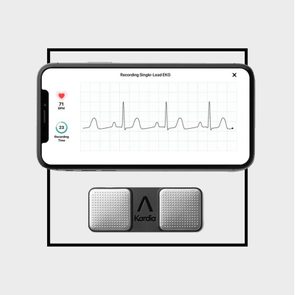Why Some Cold Medicines Aren’t Safe for People with High Blood Pressure
Updated: Oct. 10, 2022
Certain cold and flu drugs may not be safe if you have high blood pressure. Here's how to read labels and choose the right medicine for you.
Cold medicine for high blood pressure
If you have high blood pressure and come down with the common cold, flu, or even Covid-19, don’t reach for just any cold or flu drug that may be in your medicine cabinet.
Certain decongestants and non-steroidal anti-inflammatories (NSAIDs) may have an unwanted side effect: a further increase in your already elevated blood pressure. (Here’s what to know about healthy blood pressure.)
High blood pressure or hypertension is a major threat to heart health. It refers to the force of blood pushing against the walls of your arteries. High blood pressure is often called a silent killer as it produces no symptoms, which means you may not even know you have it as you’re taking a cold or flu remedy. The only way to know where you stand is to know your numbers. You can have your blood pressure measured by a healthcare provider or use an at-home blood pressure monitoring device. (Here are the best at-home blood pressure monitors on Amazon.)
Blood pressure measurement consists of two numbers. Systolic pressure, the upper number in a reading, is the pressure when your heart beats and pumps blood through your body, while diastolic pressure, the lower number, is the force when your heart is at rest and is filling up with blood.
A blood pressure of less than 120 millimeters of mercury (mm Hg) systolic and less than 80 mm Hg diastolic is considered normal. High blood pressure stage 1 is defined as 130-139 over 80-89 mm Hg, and stage 2 hypertension is at or above 140/90 mm Hg.
Eating a high-salt diet, not getting regular exercise, smoking, and even taking certain cold and flu medications can all raise your blood pressure. (These foods help lower blood pressure naturally.)
Decongestants and high blood pressure: What not to take
Decongestants such as pseudoephedrine, ephedrine, phenylephrine, naphazoline, and oxymetazoline reduce nasal stuffiness by narrowing blood vessels and reducing swelling in the nose.
“But this narrowing of the blood vessels can increase blood pressure,” explains Sondra DePalma, a physician assistant and certified hypertension clinician at PinnacleHealth Cardiovascular Institute in Wormleysburg, Pennsylvania. DePalma was a co-author of the 2017 guidelines from the American Heart Association (AHA) and American College of Cardiology published in Hypertension, focusing on how to manage high blood pressure in adults.
“Decongestants typically contain pseudoephedrine, ephedrine, or phenylephrine, and all of these can cause an increase in heart rate and a constriction of arteries resulting in an increase in blood pressure,” agrees Stephen J. Huot, MD, professor, associate dean, and director of graduate medical education at Yale School of Medicine/Yale New Haven Hospital in Connecticut.
These medications act similarly to adrenaline, a stress hormone that is released by the sympathetic nervous system that increases heart rate and blood pressure, he says. This is the same way that stress can cause high blood pressure.
NSAIDs and high blood pressure
Nonsteroidal anti-inflammatory drugs (NSAIDs) such as naproxen (Aleve) and ibuprofen (Advil, Motrin) cause sodium and fluid retention, which can also increase blood pressure. And, taken for long periods of time, this type of medication increases the risk of heart attack and stroke, DePalma says.
“If decongestants or cold medications containing nonsteroidal anti-inflammatories are needed, they should be taken at the lowest needed dose and for the shortest period of time possible,” DePalma says.
NSAIDs can also interfere with the effectiveness of certain high blood pressure medications such as diuretics, angiotensin-converting enzyme inhibitors, and angiotensin receptor blockers, Dr. Huot adds.

Safe cold and flu alternatives for high blood pressure
You don’t need to put up with cold or flu symptoms if you have high blood pressure, DePalma says, because safe alternatives exist.
Look for labels that state the medication is safe for people with high blood pressure or heart disease. “Medications labeled ‘HBP’ (high blood pressure) or ‘decongestant-free’ are usually safe and not associated with heart risks,” she says.
“Cold medications that contain expectorants like guaifenesin (to help clear mucus from the head and lung), cough suppressants like dextromethorphan, and/or acetaminophen for fever reduction and pain relief, are likely safe for people with high blood pressure,” she continues. For example, Tylenol contains acetaminophen and Mucinex contains guaifenesin, although always check labels.
“Other treatments, such as intranasal sprays, throat lozenges, and humidifiers/vaporizers may help relieve cold and flu symptoms,” DePalma says.
Safe cold medications for high blood pressure
Safe medications if you have high blood pressure and a cold include acetaminophen for fever and general achiness, Dr. Huot suggests. Topical NSAIDs, which you rub on your skin, are also a viable alternative, according to guidelines from the AHA and American College of Cardiology.
Voltaren Arthritis Pain Gel is an NSAID gel that targets joint pain that is now available without a prescription.
Look carefully at the active and inactive ingredients for words like salt, sodium, or soda, which can also raise blood pressure. the AHA cautions. If you have high blood pressure, aim for 1,500 mg of sodium or less per day, including sodium found in many over-the-counter medicines, the group cautions.
The last word
Having a cold or the flu is stressful to the body and can increase heart risk, DePalma points out. Make sure you get your yearly flu shot, wash your hands frequently, and avoid people who are sick to lower your risk of becoming ill.
Be sure to read labels of over-the-counter medicines carefully, and when in doubt, ask a doctor, physician assistant, nurse practitioner, or pharmacist if you are making a safe choice.
Next, here’s what you need to know about high blood pressure and coronavirus.





















